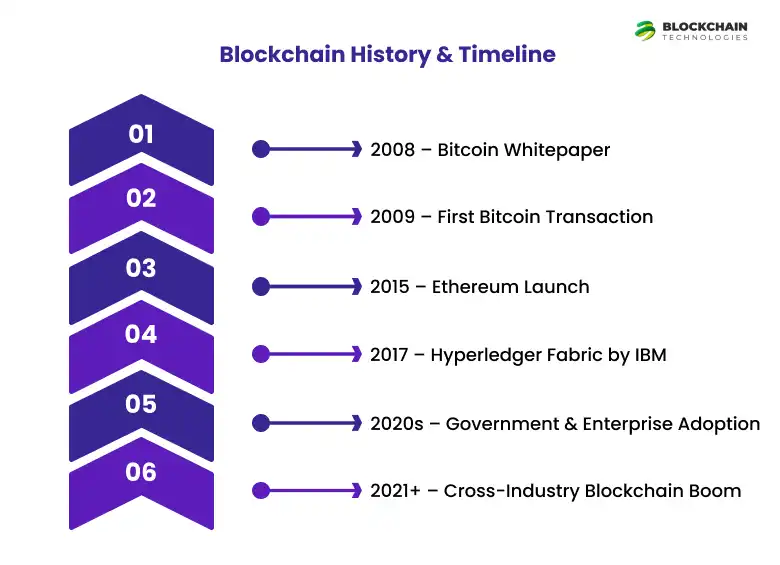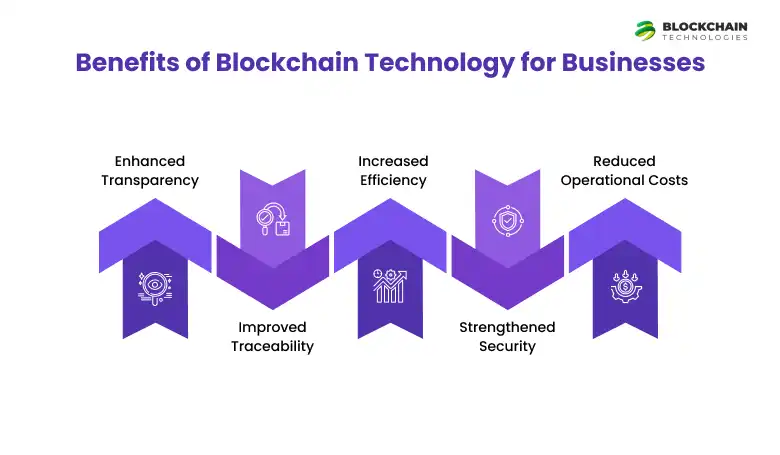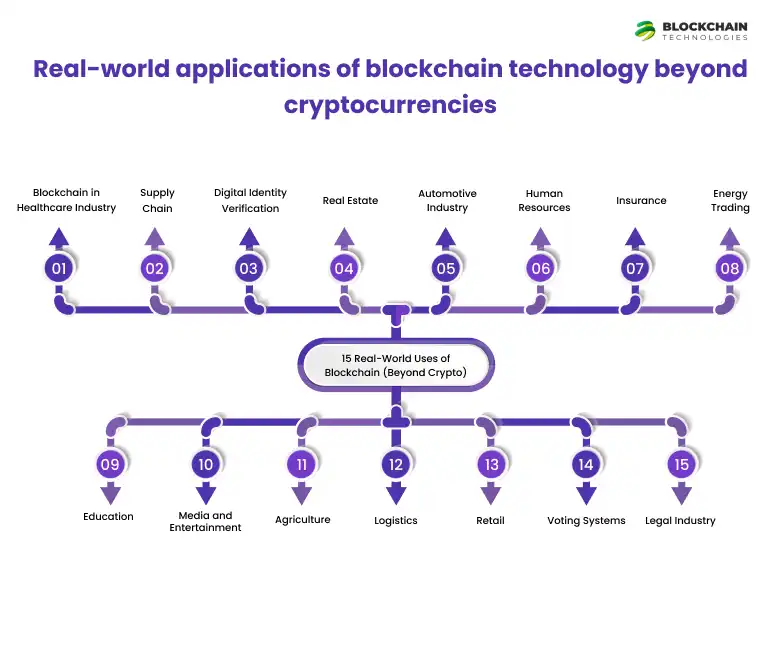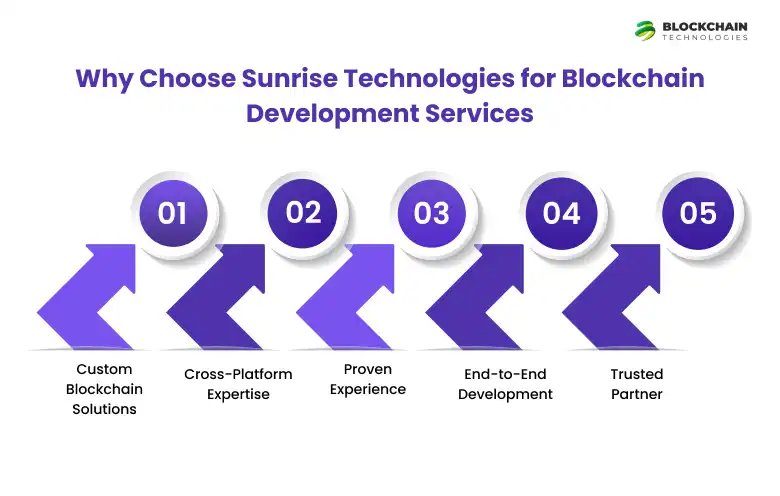Exploring Blockchain Applications Beyond Cryptocurrencies
May 29,2025

When blockchain technology first showed up with Bitcoin, most people only linked it to digital currencies. Fast forward a few years, and the story has completely changed. What started as the tech behind cryptocurrencies like Bitcoin and Ethereum has now evolved into a game-changer across industries. From boosting supply chain transparency to transforming healthcare systems, businesses everywhere are tapping into the real-world applications of blockchain technology to solve everyday problems and drive innovation.
- The global blockchain technology market is projected to reach $1.4 trillion by 2030, growing at a CAGR of 85.9%.
- According to Gartner, 60% of CIOs plan to integrate enterprise blockchain solutions by 2025.
While cryptocurrencies like Bitcoin dominate headlines, enterprises are quietly revolutionizing industries using blockchain applications for supply chains, healthcare, and governance. Let’s explore how businesses are exploring Blockchain applications beyond cryptocurrencies
and how this enterprise blockchain revolution is shaping the future.
Blockchain History & Timeline:
Blockchain technology made its debut in 2008 with the advent of Bitcoin. However, the real turning point came when developers began exploring its use beyond cryptocurrency. Here’s a quick look at its evolution:

- 2008: Satoshi Nakamoto’s whitepaper introduces Bitcoin, laying the foundation for blockchain technology.
- 2009: First Bitcoin transaction, proving decentralized peer-to-peer value transfer.
- 2015: Ethereum launches, enabling smart contracts and programmable blockchain logic.
- 2017: IBM launches Hyperledger Fabric, targeting enterprise blockchain solutions.
- 2020s: Governments and Fortune 500 companies adopt blockchain for supply chain transparency and healthcare data management.
- 2021 onwards: Surge in blockchain for business process and cross-industry applications
What Is Blockchain Technology and How Does It Work?
Let’s break it down: Blockchain technology is like a highly secure digital notebook that’s shared across a network. Instead of storing data in one place, it’s spread across multiple systems, making it super secure, tamper-proof, and transparent.
This distributed ledger system lies at the heart of countless blockchain applications, especially in industries that demand high levels of data trust and security, like finance, healthcare, and logistics. Here’s a simple breakdown of the building blocks that make enterprise blockchain so powerful:
Decentralization
Instead of having one central authority control everything, data is stored across multiple nodes. This eliminates single points of failure and enhances network security.
Immutability
Once data is written to the blockchain, it can’t be changed or deleted. This immutable structure is what builds trust in blockchain for business environments.
Transparency
Everyone on the network has access to the same ledger, so blockchain solutions for supply chain transparency or financial tracking are fully verifiable.
Smart Contracts
Think of these as mini programs that run on the blockchain. Smart contracts are self-executing contracts with rules written directly into code, automating transactions without the need for intermediaries.
Thanks to these core components, the real-world applications of blockchain technology are growing rapidly, from blockchain in supply chain systems to the benefits of blockchain in the healthcare industry. Whether you’re a startup or an enterprise, blockchain beyond cryptocurrencies is proving to be more than just a trend, it’s a transformative force for digital trust and innovation.
Blockchain According to the Brightest Minds in Tech
“Blockchain is not just about cryptocurrencies; it’s about redefining trust in digital systems.” – Vitalik Buterin (Ethereum Co-founder)
“The real power lies in blockchain applications for transparency, security, and efficiency.” – Don Tapscott (Author, Blockchain Revolution)
Benefits of Blockchain Technology for Businesses
Wondering why companies are investing heavily in blockchain? The benefits of blockchain technology for businesses go beyond just keeping records, they’re reshaping how operations, security, and efficiency are handled at scale.

Here’s how adopting enterprise blockchain solutions gives businesses a serious edge:
1. Enhanced Transparency
With blockchain, all transactions are logged in a distributed ledger accessible to permissioned users. This makes audits faster and more reliable, ensuring complete data transparency in business operations.
2. Improved Traceability
Every transaction or product movement is time-stamped and linked across the supply chain. Whether you’re tracking food, pharmaceuticals, or consumer goods, blockchain offers real-time product traceability from origin to delivery, ideal for logistics, retail, and manufacturing.
3.Increased Efficiency
Thanks to smart contracts, routine tasks like invoicing, approvals, or inventory updates can be automated on the blockchain, reducing manual effort and eliminating bottlenecks. This means faster workflows and fewer human errors.
4.Strengthened Security
Blockchain uses advanced cryptographic algorithms to secure every transaction. Once data is written, it’s immutable, making it nearly impossible to tamper with. Perfect for industries that prioritize data integrity, such as finance, insurance, and healthcare.
5.Reduced Operational Costs
Blockchain eliminates the need for intermediaries and redundant processes. With decentralized trust and automated verification, businesses can cut costs on third-party services, compliance overhead, and reconciliation tasks.
Looking to reduce costs and boost trust?
Explore blockchain-based smart contracts and data integrity.
Real-world applications of blockchain technology beyond cryptocurrencies
Let’s explore 15 real-world examples of blockchain applications beyond cryptocurrencies, each bringing real innovation to traditional processes:

1. Blockchain in Healthcare Industry
Blockchain in the healthcare industry is not just about keeping records, it’s about reshaping the entire medical ecosystem. From protecting patient confidentiality to tracking pharmaceuticals, this technology is driving trust and transparency. So, there are real-world applications of blockchain technology in healthcare and logistics. Niw let’s see for healthcare:
Key Use Cases:
- Secure Patient Data Exchange: Blockchain ensures encrypted, decentralized access to patient data, eliminating the risk of a single point of failure and ensuring data privacy compliance (e.g., HIPAA).
- Drug Traceability: Pharmaceutical supply chains benefit from end-to-end drug traceability that reduces counterfeiting and increases transparency.
- Electronic Medical Records (EMRs): Blockchain makes EMRs interoperable across different providers, eliminating duplication and improving care coordination.
- Clinical Trials: Smart contracts automate trial protocols and ensure tamper-proof recording of trial results.
- Medical Billing and Insurance: Blockchain prevents overbilling and fraud while enabling real-time insurance verification using smart contracts.
The use of blockchain for healthcare data security, can ensure data integrity, interoperability, and supply chain visibility for pharmaceuticals, leading to better patient outcomes and more efficient healthcare systems.
2. Supply Chain
So, what are all the Blockchain in Supply Chain: Use Cases Enterprises Can’t Ignore and how blockchain is transforming supply chain management? Supply chains today face a trust deficit, fraud, counterfeit goods, and opaque logistics plague even the biggest brands. Enter blockchain solutions for supply chain transparency, a game-changer for global trade. With its decentralized architecture and immutable ledger, blockchain brings real-time visibility, traceability, and accountability to every step in the supply chain.
Key Use Cases:
- End-to-End Product Traceability: Track goods from raw materials to retail shelves using blockchain's tamper-proof records, ensuring authenticity and ethical sourcing.
- Real-Time Inventory Management: Blockchain integrates with IoT to offer live updates on product location, temperature, and condition, crucial for perishable goods.
- Fraud Prevention: Immutable logs eliminate data tampering, making it easy to detect and prevent fraud or counterfeiting.
- Smart Contracts for Automation: Automate shipping terms, customs clearance, and payments, reducing delays and paperwork.
By leveraging blockchain in supply chain management, businesses can reduce operational risk, enhance customer trust, and ensure regulatory compliance.
3. Digital Identity Verification
Blockchain identity management solutions using blockchain technology by which digital identities are managed, eliminating central points of failure, reducing fraud, and giving individuals sovereign control over their identity.
Key Use Cases:
- Decentralized Identity (DID) Frameworks: Blockchain allows creation of tamper-proof digital identities where users control what data to share and with whom, enhancing privacy and consent.
- eKYC (Electronic Know Your Customer): Speeds up verification processes for banks and fintechs by enabling real-time validation through blockchain-based credentials.
- Cross-border Digital Identity: Enables interoperability of digital identity across nations and institutions, ideal for immigration, education, and international commerce.
- Access Management: Secures digital identity in enterprise IT systems with immutable access records and role-based authentication powered by smart contracts.
- Fraud Prevention: With blockchain’s immutability and timestamping, identity spoofing, credential forgery, and account takeovers are drastically reduced.
By leveraging blockchain, businesses can shift from identity verification as a service to identity verification as a right, boosting security, transparency, and user trust across industries.
4. Real Estate
Blockchain in real estate bringing speed, trust, and transparency to an industry traditionally burdened by paperwork and middlemen. By digitizing processes and reducing manual intervention, blockchain in real estate enhances transaction speed, minimizes fraud, and unlocks liquidity in global property markets.
Key Use Cases:
- Smart Contract-enabled Property Transfers: Automate purchase agreements and property title changes without third-party delays.
- Immutable Land Registries: Blockchain in government services to create tamper-proof digital land records, cutting fraud and duplication.
- Real-Time Ownership Verification: Investors and buyers can instantly verify property ownership and history via blockchain-based platforms.
- Tokenized Real Estate: Enables fractional property investment through tokenized assets, lowering entry barriers for small investors.
- Rental and Lease Automation: Smart contracts manage lease terms, rent collection, and dispute resolution, streamlining landlord-tenant relationships.
5. Automotive Industry
Blockchain is revolutionizing the automotive industry with secure supply chain visibility, vehicle history tracking, and autonomous vehicle data sharing. The AI and blockchain integration ensures automotive data integrity, builds consumer trust, and supports the rise of autonomous mobility.
Key Use Cases:
- Vehicle Lifecycle Management: Track vehicle history from manufacturing to resale, ensuring tamper-proof maintenance and accident records.
- Spare Parts Authenticity: Combat counterfeit auto parts through blockchain-verified components.
- EV Charging Networks: Enable real-time, decentralized billing for electric vehicle charging through smart contracts.
- Usage-Based Insurance (UBI): Immutable driving data stored on the blockchain improves risk assessment and personalized premiums.
6. Human Resources
Blockchain is streamlining hiring and workforce management with verified credentials, smart contracts for payroll, and secure employee records. For HR departments, blockchain offers efficiency, transparency, and fraud prevention in hiring and personnel management.
Key Use Cases:
- Verified Educational and Work Credentials: Employers can instantly verify certificates, degrees, and past employment through tamper-proof records.
- Payroll via Smart Contracts: Automate salary disbursements based on pre-defined conditions and milestones.
- Compliance and Auditing: Ensure HR processes meet legal standards with immutable documentation.
- Freelancer and Gig Worker Contracts: Manage terms, payments, and disputes transparently through blockchain-based agreements.
7. Insurance
Blockchain in insurance industry are automating claims, streamlining policy management, and enhancing transparency. Blockchain in insurance simplifies administrative tasks, ensures trustworthy claims management, and enhances customer satisfaction.
Key Use Cases:
- Claims Automation with Smart Contracts: Smart contracts automatically trigger claims payouts based on predefined event conditions, reducing human error and accelerating claims processing.
- Fraud Prevention: Blockchain’s immutable ledger ensures that policies and claims cannot be altered, significantly reducing fraudulent activities in claims and underwriting.
- Decentralized Risk Pools: Blockchain allows the creation of peer-to-peer insurance platforms, where individuals can contribute to a shared risk pool without the need for a centralized insurer.
- Reinsurance: Blockchain facilitates transparent and faster reinsurance transactions, improving the efficiency of risk-sharing across insurers and reinsurers.
- Microinsurance: Blockchain enables the creation of low-cost microinsurance products that can be tailored to individual needs, offering protection to underserved populations.
8. Energy Trading
Blockchain is facilitating the decentralization of energy markets, allowing for peer-to-peer energy trading with transparency, security, and real-time tracking. By leveraging blockchain, the energy sector can become more efficient, sustainable, and transparent.
Key Use Cases:
- Peer-to-Peer Energy Exchange: Blockchain enables individuals or organizations to sell excess energy (e.g., from solar panels) directly to others in a decentralized marketplace, bypassing traditional energy grids.
- Smart Grids and Energy Distribution: Blockchain ensures efficient energy distribution across grids, allowing for real-time tracking of energy use, balancing supply and demand, and reducing waste.
- Transparent Pricing: Blockchain enables real-time, transparent pricing for energy, allowing consumers to see the cost of energy on the market and make informed decisions.
- Energy Tokenization: Blockchain allows for the tokenization of energy, turning it into a tradeable digital asset that can be bought, sold, or traded globally.
- Carbon Credit Tracking: Blockchain can be used to track and trade carbon credits, ensuring the credibility and transparency of environmental initiatives.
9. Education
Blockchain is revolutionizing the education industry by ensuring secure credential verification, enhancing transparency, and enabling lifelong learning records. In education, blockchain offers secure verification, better student engagement, and streamlined administrative processes.
Key Use Cases:
- Verified Educational Credentials: Blockchain enables students to hold tamper-proof digital diplomas and certificates, which can be instantly verified by employers or educational institutions, reducing fraud.
- Digital Learning Portfolios: Blockchain allows learners to maintain a complete, immutable record of their academic achievements, including coursework, exams, and certifications, over their lifetime.
- Decentralized Scholarships and Funding: Blockchain enables decentralized scholarships and funding platforms, where donors can directly contribute to student education with transparent tracking of funds.
- Smart Contracts for Tuition Payments: Universities and institutions can implement smart contracts for tuition payments, ensuring timely payments and automating administrative tasks.
- Credential Sharing Across Borders: Blockchain facilitates the seamless transfer and recognition of qualifications between institutions and countries, making cross-border education and employment easier.
10. Media and Entertainment
Key Use Cases:
- Smart Contracts for Royalty Payments: Blockchain-based smart contracts automatically execute royalty payments to creators, ensuring timely and transparent distribution based on content consumption.
- Digital Content Ownership: Blockchain guarantees clear ownership records, helping creators prove and protect their intellectual property and combat piracy.
- Piracy Control and Anti-Counterfeiting: Blockchain’s immutable ledger allows for traceability of content, making it easier to identify and prevent the distribution of pirated content.
- Transparent Content Licensing: Blockchain tracks the usage rights of media, ensuring content licensing agreements are executed without discrepancies, benefiting both content creators and distributors.
- Decentralized Streaming Platforms: Blockchain enables the creation of decentralized media platforms, where content creators can distribute directly to consumers, bypassing intermediaries and retaining more revenue.
11. Agriculture
Blockchain is transforming agriculture by enabling end-to-end transparency in the supply chain, ensuring food safety, and streamlining international trade. Blockchain in agriculture enhances food security, efficiency, and global trade compliance.
Key Use Cases:
- Farm-to-Table Traceability: Blockchain allows consumers to track the origin of food products, from farm to table, ensuring quality and sustainability in the agricultural supply chain.
- Food Safety and Quality Assurance: Blockchain ensures safe handling and storage of agricultural products, providing immutable records of temperature, handling, and processing data to guarantee freshness and compliance with safety standards.
- Streamlined Export Documentation: Blockchain simplifies export documentation, automating paperwork for international trade and ensuring compliance with regulatory requirements.
- Smart Contracts for Fair Trade: Blockchain-enabled smart contracts ensure fair payment to farmers and workers based on predefined conditions, reducing the risk of fraud and exploitation.
- Sustainability Tracking: Blockchain enables sustainable farming practices to be verified, allowing consumers and retailers to support eco-friendly agricultural products with transparent certification.
12. Logistics
Blockchain is revolutionizing logistics by enhancing fleet visibility, securing cargo authenticity, and streamlining document management in the supply chain. Blockchain in logistics provides secure, efficient, and transparent operations, improving supply chain management.
Key Use Cases:
- Real-Time Fleet Visibility: Blockchain enables live tracking of shipments, providing logistics companies and customers with transparent, real-time data on the location and status of goods.
- Cargo Authenticity and Security: Blockchain ensures that cargo details (e.g., weight, origin, contents) are accurately recorded, preventing theft or tampering during transportation.
- Paperless Documentation: Blockchain eliminates manual paperwork by automating and digitizing documents like bills of lading, customs declarations, and delivery receipts, reducing delays and errors.
- Smart Contracts for Automated Payment: Blockchain’s smart contracts automate payment processing once cargo is delivered and verified, reducing the need for intermediaries and speeding up settlements.
- Optimized Routing and Scheduling: Blockchain can track and analyze logistical data to optimize routing, ensuring that goods are delivered efficiently while minimizing costs and environmental impact.
13. Retail
Blockchain in retail industry are protecting against counterfeit products, ensuring product authenticity, and improving customer trust and loyalty. Blockchain in retail boosts customer confidence, protects against fraud, and strengthens brand loyalty.
Key Use Cases:
- Counterfeit Prevention: Blockchain verifies product authenticity at every stage of the supply chain, ensuring that consumers receive genuine products and preventing the sale of counterfeit goods.
- Product Traceability: Blockchain tracks products from their origin to store shelves, providing consumers with full visibility into the sourcing and manufacturing process, building trust in the brand.
- Smart Contracts for Transactions: Retailers can use blockchain to automate smart contracts for sales and promotions, improving transaction efficiency and reducing the risk of fraud.
- Loyalty Programs and Rewards: Blockchain enables transparent and secure loyalty programs, allowing retailers to offer customers token-based rewards that are tamper-proof and easily redeemable.
- Decentralized Retail Platforms: Blockchain allows retailers to create decentralized platforms where consumers can interact directly with brands, reducing costs and improving personalization in retail services.
14. Voting Systems
Key Use Cases:
- Transparent and Immutable Voting Records: Blockchain ensures that all votes are securely recorded, making it virtually impossible to alter or manipulate the results.
- Remote and Digital Voting: Blockchain allows for secure remote voting through digital platforms, eliminating the need for physical ballots while maintaining privacy and preventing fraud.
- Voter Identity Verification: Blockchain-based systems authenticate voter identity with decentralized digital IDs, ensuring one person, one vote.
- Instant and Transparent Election Results: Blockchain provides real-time updates, ensuring that election results are published securely and instantly without delays or discrepancies.
- Cross-Border Voting: Blockchain makes it possible for expats or citizens abroad to cast their votes securely, making elections more inclusive and global.
15. Legal Industry
Blockchain is transforming the legal industry by enabling smart contracts, securing sensitive case files, and streamlining legal workflows with unparalleled efficiency and transparency. Blockchain in the legal industry accelerates legal processes, improves security, and enhances data record management, making legal services more efficient and transparent.
- Smart Legal Contracts: Blockchain enables the creation of self-executing contracts that automatically enforce terms when predefined conditions are met, reducing the need for intermediaries and minimizing the potential for human error or fraud.
- Immutable Case File Storage: Blockchain provides secure and tamper-proof storage for case files, ensuring that sensitive legal documents are immutable and only accessible by authorized parties, enhancing data integrity and confidentiality.
- Decentralized Legal Platforms: Blockchain can facilitate the creation of decentralized platforms for legal services, allowing clients and legal professionals to interact directly, eliminating the need for intermediaries, and reducing legal costs.
- Evidence Authentication: Blockchain ensures authenticity of digital evidence, allowing for transparent and verifiable tracking of evidence chains, minimizing the risk of tampering and enhancing the credibility of cases.
- Automated Payment Systems: Blockchain’s smart contracts also automate payment processes in legal settlements, ensuring timely and accurate disbursement of funds once the conditions of a case or agreement are met.
Digitize Your Supply Chain with Blockchain Transparency
Blockchain makes it possible, secure, transparent, and fast.
Popular Brands Implementing Blockchain
Real-World Examples of Enterprise Adoption of Blockchain Technology
1. IBM:
IBM’s Food Trust Blockchain is a revolutionary system that enhances transparency and traceability in the food supply chain. By partnering with Walmart, IBM has created an advanced blockchain-powered platform that ensures real-time traceability of food products from farm to table. The solution enables instant verification of the journey of food items, providing consumers with detailed information about product origins, safety standards, and expiration dates. For example, a simple query can trace the journey of a pack of spinach from its farm to a consumer’s plate in seconds, helping identify and eliminate contamination sources swiftly.
2. Apple:
Apple is leveraging blockchain to enhance supply chain transparency and digital identity management. By using immutable ledgers, Apple tracks the origin and movement of components, preventing counterfeiting and ensuring ethical sourcing. Blockchain also supports secure, decentralized identity verification, providing users greater control over personal data while ensuring privacy and security across Apple services.
3. Porsche:
Porsche implements blockchain for secure car sharing through its “Porsche Passport” platform, using smart contracts to streamline vehicle rental with tamper-proof transactions. Additionally, Porsche applies blockchain in its supply chain to enhance traceability and authenticity of parts, ensuring quality control and reducing the risk of counterfeit components in vehicle manufacturing.
4. Estonia
Estonia has become a global leader in digital governance, offering a range of blockchain-based public services. As the world’s first blockchain-powered government, Estonia utilizes this technology for digital identities, e-residency, and secure digital voting systems. The Estonian government’s X-Road platform is built on blockchain to securely link different public and private sector databases, allowing citizens to interact with government services efficiently and securely. Estonia’s pioneering use of blockchain for public services has set a global benchmark for secure digital identities and e-government, enabling other nations to adopt similar frameworks for improving citizen engagement and government transparency.
Why Choose Sunrise Technologies for Blockchain Development Services

1. Custom Blockchain Solutions
We build industry-specific blockchain applications that align with your unique business goals and operational workflows.
2. Cross-Platform Expertise
Our developers excel in leading frameworks like Ethereum, Hyperledger, Corda, and Multichain for robust and scalable solutions.
3. Proven Experience
With a rich portfolio of enterprise-grade blockchain platforms deployments, we bring trusted hands-on expertise to every blockchain project.
4. End-to-End Development
We offer full-cycle blockchain services, from consulting and architecture design to integration, deployment, and maintenance.
5. Trusted Partner
Final Thoughts:
Turn complexity into clarity with blockchain solutions.
Reduce manual effort, increase trust, and automate seamlessly.
FAQs:
Real-world applications of blockchain technology include healthcare, supply chain, voting systems, real estate, and education. These innovations are being realized through partnerships with trusted blockchain app development companies that specialize in creating secure, decentralized applications tailored to each industry.
How businesses use blockchain today ranges from fraud prevention to streamlining operations with smart contracts.
Healthcare enterprises are using blockchain to securely share patient data, improve transparency, prevent fraud, and streamline processes like billing and clinical trials, leading to faster, safer, and more personalized care.
Digital IDs, e-voting, and document verification are top blockchain use cases in government services.
Development costs for a DeFAI platform can range from $50,000 to over $500,000, depending on the scope, AI features, blockchain complexity, and level of automation required. Integrating autonomous agents, smart analytics, and multi-chain compatibility typically raises the cost.

